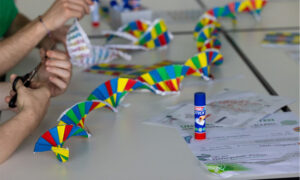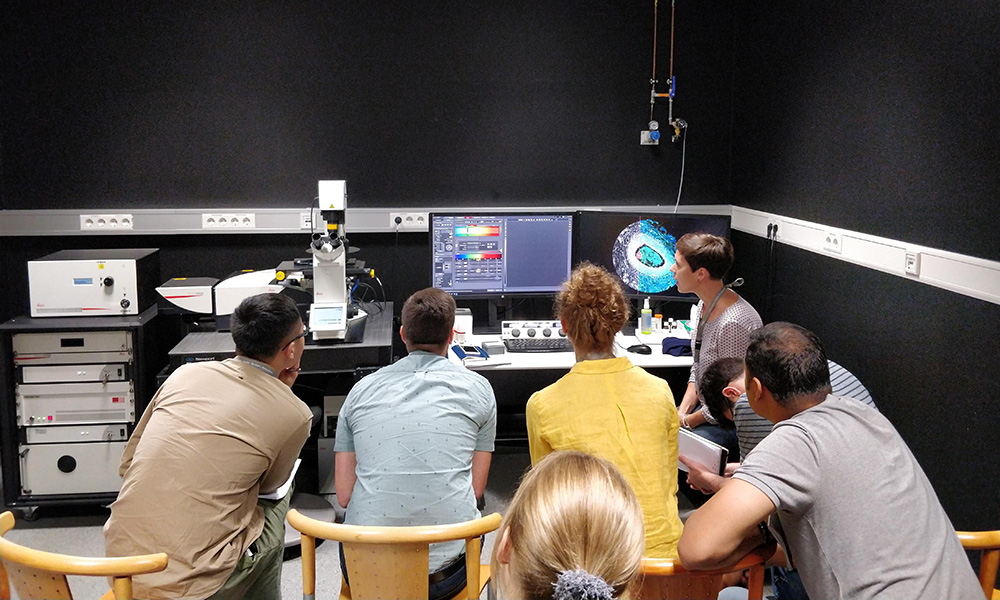
Read the latest Issue
The EMBL International PhD Programme will evolve its training offers in line with the increasing need for interdisciplinary approaches in life sciences

The EMBL International PhD Programme (EIPP) is well known for providing state-of-the-art training to its students. This includes a good balance between theory and practice, close supervision yet creative freedom, a spirit of collaboration, and early independence.
Under the direction of Monika Lachner, Head of Internal Scientific Training and Dean of Graduate Studies, this already well-regarded programme is looking to the future.
“We wanted the additional capacity to push projects that enable innovation in graduate education,” Lachner said, highlighting the importance of a newly established program manager position.
Most recently, Fulvio Grigolato joined the programme’s two Graduate Officers, Vira Beck and Carolina Garcia Sabate. A physicist by training, Grigolato will contribute to further expanding EIPP’s interdisciplinarity and helping it transition with EMBL’s next five-year Research Programme.
EMBL has long offered a multidisciplinary approach to science and research. Likewise, EIPP has increasingly encouraged candidates with backgrounds in chemistry, physics, mathematics, molecular medicine, computer sciences, or engineering to apply, so to work closely with biologists answering fundamental questions in life sciences. Currently, approximately 16% of EIPP fellows come from complementary fields.
“Due to their increasing complexity, the scientific questions we face as a society demand increased cooperation among different disciplines,” Grigolato said. “A solid interdisciplinary training is the best way to equip future leaders in academia, industry, policymaking, and beyond with the skills required to tackle those questions.”
Interdisciplinarity is central to EMBL’s forthcoming scientific programme, Molecules to Ecosystems 2022–2026. The organisation’s research will remain firmly rooted in molecular biology, with the goal of gaining better understanding of life in the context of its environment. This requires unveiling not only how living organisms work and function individually, but also how they interact with other organisms and their ecosystems.
EMBL’s ambitious approach to life science research creates additional opportunities for complementary disciplines – such as mathematics, engineering, ecology, climatology, and many others – to help investigate living systems and advance understanding of fundamental biological processes. For EIPP, Lachner said, “We have two important challenges: to attract candidates from these backgrounds and then provide the right training.”
As such, the programme will increase its visibility at relevant university departments. Furthermore, following the success of EMBL’s Lautenschläger Summer School, EIPP will continue developing workshops that inspire undergraduate students to pursue interdisciplinary PhDs in life sciences at EMBL. EIPP will also design and integrate additional customised training modules. Furthermore, the training will reflect the increasingly crucial role that computer and data sciences play in managing and analysing massive amounts of biological data. Information generated by science – molecular biology, in particular – is steadily growing as more advanced experimental techniques provide high-resolution, multidimensional data at unprecedented rates.
“Nature doesn’t care about the cultural conventions that shape what we consider scientific disciplines,” said Anna Erzberger, a physicist and one of EMBL’s newest group leaders. “If we want a predictive understanding of the behaviour of proteins, cells, and organisms, and to push the current technological limits of what can be measured, we need expertise from physics, mathematics, computer science, and chemistry.”
EIPP fellows note the relevance of interdisciplinary training as well.
“I see EMBL as a great opportunity for collaborations,” said Franziska Walterspiel, a chemist and new Deo Group predoctoral fellow. “It will be great to see new partnerships with non-biology departments at universities emerge to strengthen the interdisciplinary aspect of EMBL.”
Tim Dullweber, an Erzberger Group predoc, described it like this: “EMBL is a door opener due to its excellent reputation.” As a physicist interested in statistical physics and theoretical biophysics, he continued: “The multidisciplinary environment teaches us how to live in between worlds, how to communicate with other physicists as well as hardcore biologists.”
This same spirit of collaboration and convergence of disciplines is at the heart of many EMBL initiatives — something expected to go beyond EMBL itself to connect with and across member states.
Within the past year, EMBL has signed several memoranda of understanding (MoUs) with a variety of international organisations whose missions complement EMBL’s and who offer further enhanced opportunities for collaboration.
Lachner also notes that EMBL’s Interdisciplinary Postdoc Programme (EIPOD) continues to be a driving force for collaboration across the organisation. The programme, co-funded by the European Commission under Marie Skłodowska-Curie Actions, supports postdocs who work on self-designed research projects involving two or more EMBL groups. Scientists from other academic institutes, clinics, and industry also participate on EIPOD research projects, thereby fostering collaboration across sectors.
Likewise, recognising its scientific services and core facilities can effectively blend disciplines – especially as EMBL’s new Imaging Centre comes online – EMBL initiated a new infrastructure training programme: Career Accelerator for Research Infrastructure Scientists (ARISE). It will attract scientists aspiring to develop and lead infrastructure services. Applications to ARISE are due in late November for training starting in 2022.
“It’s a really exciting time,” Lachner said. “I love being in the midst of this kind of change that is rich with innovative ideas to help our PhD programme grow and evolve, which in turn, takes EMBL to this next level as a global leader in science.”
Looking for past print editions of EMBLetc.? Browse our archive, going back 20 years.
EMBLetc. archive